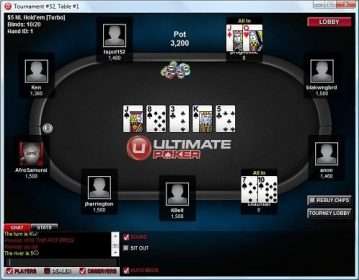Ultimate Gaming Founder: Regulations Have Hurt Online Poker Growth
Tom Breitling, co-founder of Ultimate Gaming, is not happy. He doesn’t seem to be seething with rage, but he is not thrilled at all with how his online poker room, Ultimate Poker, has been performing. Its first-mover advantage in Nevada was short lived and it is basically a non-factor in New Jersey; according to figures published by the New Jersey Division of Gaming Enforcement (NJDGE), Ultimate poker’s market share by revenue in New Jersey was only 1.9 percent in April. The overall New Jersey market has fallen well short of expectations, as well. 
In a video posted recently on YouTube, Breitling addressed the problems and while his demeanor was calm, he came across as blaming everyone except his own company. He started by blaming the unreasonable expections, saying “…our company was pushed off balance just a little bit by the revenue projections that existed for the legal online gaming market in its first year.”
He continued:
We all know that the only ones living and breathing the actual business twenty-four hours a day is us, the operators. Everyone from analysts to reporters were prognosticating at the size of the market with numbers and trends and predicting penetration in the market and average spends per customer. Well, the revenue estimates were too high. And there were some very good reasons for this.
What were those reasons? Those pesky regulations.
When regulations enter the picture, there are complications that cut into the size of the market. I learned a long time ago in my Expedia days that each computer click you ask someone to make during the e-commerce process turns away about ten to twenty percent of those customers. Looking at it another way, you lose one in ten customers with every click.
People who had played online poker in the past never had to go through this new, detailed process filled with extra clicks. No company, ever before, had asked for a social security number or for geolocation information. It was like asking people to take their shoes off and step through a metal detector at the airport after years of walking straight to the gate. It’s only natural that some of these people would think twice about flying. Some will take an attitude of “wait and see.”
“All of these attitudes can be summed up in one word: friction,” he added. “This friction impacts the user experience and affects revenues.”
All the red tape players must go through, Breitling opined, turn them off to online poker before they even start. What is supposed to be fun turns into work.
Breitling was not without optimism, though, saying that the three states with legalized online gaming – Delaware, New Jersey, and Nevada – only make up four percent of the U.S. population, so there is plenty of room for growth in the market, even if expectations remain too high. He also got a nice jab in at online poker opponents such as Sheldon Adelson, saying, “And most of us believe that all Americans should be protected and have a chance to play the games they love. We believe that the breakthrough is a matter of education and innovation and that it’s right around the corner.”
As previously mentioned, Ultimate Gaming is way behind its competitors in the New Jersey market, earning less than two percent of the state’s online gaming revenue in April. It is currently a similar story for Ultimate Poker’s player traffic. According to PokerScout.com, Ultimate Poker has a seven-day average of just five (FIVE!) cash game players, only 1.5 percent of New Jersey traffic. The Party Borgata Network holds the top position with 150 cash game players (44.8 percent), followed by WSOP.com with 120 (35.8 percent), and the All American Poker Network with 60 players (17.9 percent).
And though Ultimate Poker had a substantial first-mover advantage in Nevada, going live months before WSOP.com last year, it has fallen way behind its primary competitor in the Silver State. PokerScout shows WSOP’s cash game traffic at 95 players on average over the last seven days, while Ultimate Poker is at only 55 players. It is not a surprise that WSOP.com was able to carve out a solid customer base in Nevada, considering the strength of its brand and the gigantic company, Caesars, behind it, but its growth is a secondary story next to Ultimate Poker’s decline. Ultimate Poker needs to figure out how to climb back up.
Real Gaming, the South Point Casino’s February entry into the Nevada intrastate poker market, hasn’t garnered enough players to be any sort of factor yet.



















COMMENTS